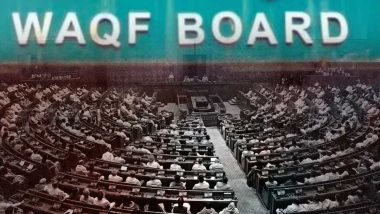Mumbai, August 8: The Union government has proposed amending the Waqf Act, 1995, to remove the Waqf Board's authority to declare properties as its own. The proposed bill will be tabled in Parliament this week. It proposes approximately 40 amendments to the current Waqf Act. According to sources, the need for the legislation arose from many requests for changes from Muslim intellectuals, women, and sects like Shia and Bohras.
A Waqf property, is a property that is dedicated in the name of God for charitable purposes, can be moveable or immovable and has existed since before formal documentation began. These properties, which can be used for public charity or private benefit, are non-transferable and held perpetually. The proceeds from Waqf properties typically support educational institutions, graveyards, mosques, and shelters, benefiting many Muslims. Waqf Act Overhaul: Bill To Amend Law Governing Waqf Boards To Be Tabled in Lok Sabha Today.
A Waqf board manages Waqf properties through nominated members who appoint custodians to oversee each property's use. The Central Waqf Council, formed in 1964, advises state-level boards and governments on property management.
What Are the Proposed Amendments in Waqf Act?
The Union government proposed about 40 amendments to the current Waqf Act. The bill mainly restricts Waqf boards' power to manage properties and increases government regulation. All claims by waqf boards will now undergo mandatory verification to ensure a more transparent process. Properties claimed by Waqf Boards will be subject to new verification to address and resolve disputes. Currently, a property can be classified as a waqf even if its original declaration is questionable or disputed. This is because, under Islamic law, waqf dedications were traditionally oral until written documentation (waqfnama) became standard. Waqf Act Overhaul: Chief Priest Shri Ram Janmabhoomi Temple Acharya Satyendra Das Ji Maharaj Welcomes Proposed Waqf Act Amendments.
Amendments also grant the central government the authority to direct audits of any waqf by an auditor appointed by the Comptroller and Auditor-General of India or a designated officer. Sections 9 and 14 will also be amended to change the composition and functioning of the Waqf Boards, ensuring better representation for women.
Objections to the Proposed Amendment
On Monday, August 6, opposition leaders claimed that the government's plan to amend the 1995 Waqf Act aims to create societal divisions. They vowed to oppose the bill in Parliament. Following this, Congress MPs KC Venugopal and Hibi Eden submitted a notice to oppose the introduction of the Waqf (Amendment) Bill, 2024, in the Lok Sabha on Thursday, August 8.
The opposition has raised several objections to the amendment. Samajwadi Party Chief Akhilesh Yadav stated that BJP is trying to take away the rights of Muslims. AIMIM President Asaduddin Owaisi has accused the Modi government of trying to take Waqf properties from Muslims and interfere with religious freedoms through proposed changes to the Waqf Act.
The All India Muslim Personal Law Board (AIMPLB) has also expressed strong opposition to any proposed reductions in the powers of Waqf boards. They warned that any changes that undermine these protections or the authority of Waqf boards will not be accepted.
(The above story first appeared on LatestLY on Aug 08, 2024 01:19 PM IST. For more news and updates on politics, world, sports, entertainment and lifestyle, log on to our website latestly.com).













 Quickly
Quickly











